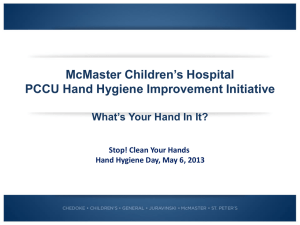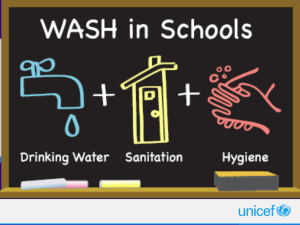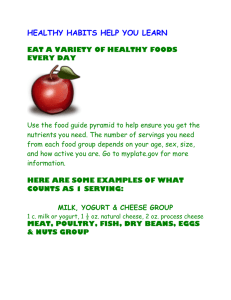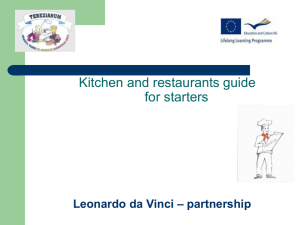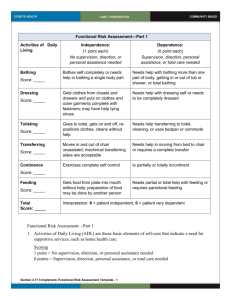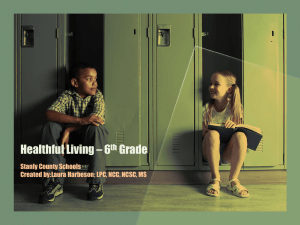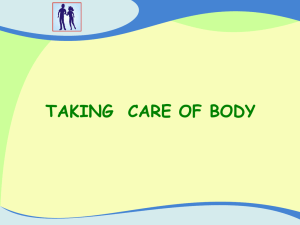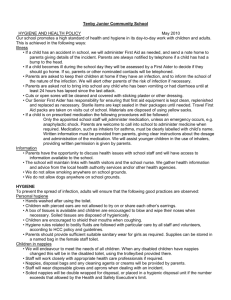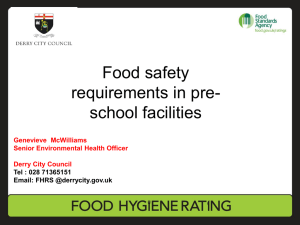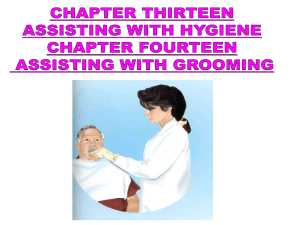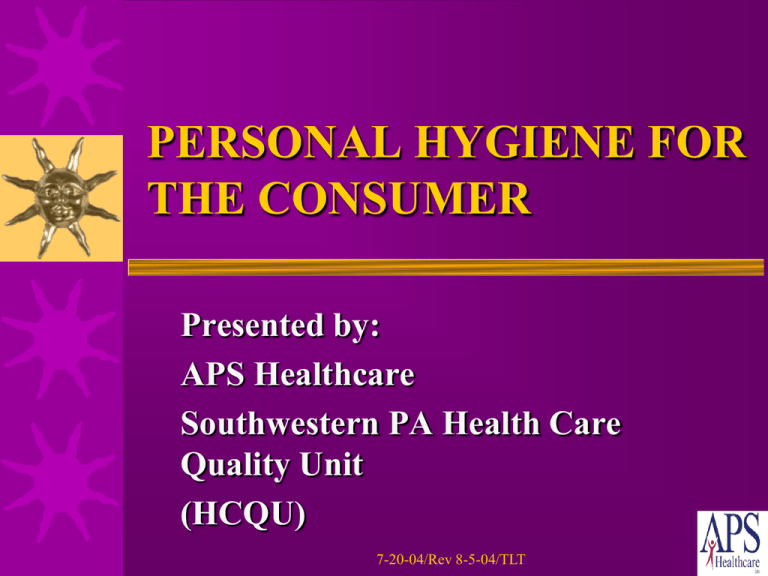
PERSONAL HYGIENE FOR
THE CONSUMER
Presented by:
APS Healthcare
Southwestern PA Health Care
Quality Unit
(HCQU)
7-20-04/Rev 8-5-04/TLT
DISCLAIMER
Information or education provided by the
HCQU is not intended to replace medical
advice from the consumer’s personal care
physician, existing facility policy or federal,
state and local regulations/codes within the
agency jurisdiction. The information
provided is not all inclusive of the topic
presented.
"Certificates for training hours will only be awarded to those who
attend a training in its entirety. Attendees are responsible
for submitting paperwork to their respective agencies."
OBJECTIVES
The participant will be able
to:
Describe how to wash the hands
Discuss the importance of personal
hygiene
List 3 areas of personal hygiene
HYGIENE TOPICS
DISCUSSED:
Hand washing
Bathroom hygiene
Bathing
Nail care
Hair care
Shaving
“Sweet smells”
Glasses/hearing
Proper disposal of
aid hygiene
Dressing
feminine hygiene
products
WHY IS IT IMPORTANT TO
BE CLEAN?
To stop the spread of germs
• Germs are invisible, but can
cause colds, the flu and
sickness
WHY IS IT IMPORTANT TO
BE CLEAN?
To feel better about yourself
• When people are clean, they
will feel better and are
happier
SOCIAL REASONS TO BE
CLEAN
Would you like to be next to
someone who smells bad or does
not bathe?
MORE SOCIAL REASONS
TO BE CLEAN
Would you like to shake hands
with someone who:
– Had their hands in their mouth?
– Had their hands in their nose?
– Did not wash their hands after using
the bathroom?
HANDWASHING
When should hands be washed?
• Before and after eating
• Before and after touching food
• After going to the bathroom
• After playing with or cleaning up after
an animal
• After blowing your nose, coughing or
sneezing
• After taking out the garbage or trash
HANDWASHING
Do you know how to properly
wash your hands?
Lesson on how to wash your
hands
BATHING/SHOWERING
Body parts to include in a bath:
• Face
• Armpits
• Feet
• Ears (outer and behind only)
• Private area (Genital/buttock
area)
How to clean an uncircumcised
penis
DON’T FORGET………
When washing hands or
bathing/showering, don’t forget
the……………
BATHING DOES A BODY
GOOD!
Bathing:
– Cleanses and conditions the skin
– Can be relaxing and comforting
– Makes you feel better about
yourself
HOW OFTEN SHOULD A PERSON
BATHE OR SHOWER?
Every day
After “sweaty” activities-examples:
–Exercising
–Work
–Doing yard work
As instructed by your MD
HAIR CARE
Daily brushing keeps
hair healthy and free of
tangles
Hair should be cut every
4-6 weeks to keep it
healthy
HAIR CARE
Don’t forget to use SHAMPOO
LESSON ON LICE
LESSON ON LICE
Lice are bugs that can live in
the hair
Report to staff if head is itchy
PREVENTING LICE
To prevent lice, DO NOT share:
• Combs/brushes
• Hats
• Barrettes
• Headbands
• Any hair care accessory
SWEET SMELLS
Change clothes and underwear
daily
Use deodorant and some
perfume/cologne
–Too much perfume/cologne
can make other people sick
–Do not use instead of
bathing!!
SWEET SMELLS
Preventing foot odor
• Air out shoes
• Wear cotton socks
• Thoroughly wash feet
DISPOSAL OF PERSONAL
HYGIENE PRODUCTS
Change when needed to prevent
odors and infection
Dispose of in the garbage or trash
Do not flush sanitary napkins
(pads) down the toilet
BATHROOM HYGIENE
After using the toilet it is
important to:
–Clean buttock/genital area
with toilet paper
–Flush toilet
–Wash and dry hands
USE OF TOILET PAPER
TOILET PAPER
– More is not better
– Only use what is needed
NAIL CARE
After bathing, nails are softer
and easier to cut
Be careful not to
cut the nail too short
NAIL CARE
File edges of nails
Cutting toenails
What to report
SHAVING
Know medications
• Certain medications can
make cuts bleed longer
Keep beards/mustaches
trimmed and neat looking
SHAVING
NEVER share razors with
anyone and DO NOT use
someone else’s razor
GLASSES/HEARING AID
Clean glasses everyday to see
clearly
Put glasses/hearing aids in a
case when not using
GLASSES/HEARING AID
Try to avoid setting the glasses
or hearing aid down anywhere
but in the case
Clean hearing aid as told to do
by the doctor
DRESSING
Wear clean clothes everyday
Tell your caregiver if clothes
have tears or holes in them
Wash your clothes so you always
have clean clothes to wear
IMPORTANCE OF
PERSONAL PROPERTY
DO NOT use someone else’s:
• Make-up
• Soap
• Shampoo
• Hair accessories
• Razor
• Deodorant
IMPORTANCE OF
PERSONAL PROPERTY
DO NOT use someone else’s:
• Washcloth
• Perfume
• Clothes
• Toothbrush
• Jewelry
REFERENCES
Ladies Home Journal. Kids Hygiene.
Retrieved 6-29-04 from World Wide Web:
http://www.lhj.com/lhj/category.jhtml;jsession
id=C3RVIJWY51BEFQFIBQNSAOWAVAB
B4IV0?categoryid=/templatedata/hk/category/
data/Safety_KidsHygiene.xml
Taylor, Lillis, LeMone. Fundamentals of
Nursing: The Art and Science of Nursing
Care. Philadelphia. J. B. Lippincott Company
1989.
REFERENCES
Good Grooming For Kids. Oracle Think Quest
Education Foundation.Retrieved 7-6-04 from
World Wide Web:
http://www.thinkquest.org/library/site_sum.ht
ml?tname=22484&url=22484/
Personal Hygiene: Grooming Routines.
Retrieved 7-6-04 from World Wide Web:
http://www.webhealthcentre.com/general/ph_r
out.asp
For more information on this or
any other physical or behavioral
health topic, please visit our website
@
www.hcqu.apshealthcare.com

